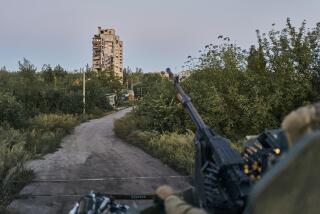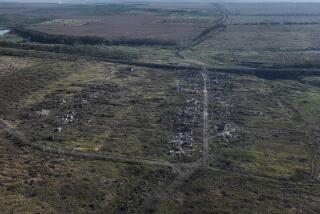Bosnians Push Army Offensive Around Sarajevo
- Share via
SARAJEVO, Bosnia-Herzegovina — Bosnian government forces, pressing their most ambitious military offensive in three years of war, lost a key enemy Serb supply road Saturday but continued to push to surround Bosnian Serb villages, U.N. officials said.
Fighting that has raged since Thursday in and around Sarajevo eased somewhat Saturday, although sporadic machine gun and rocket fire intermingled in the evening with a ferocious thunderstorm.
There were reports that Bosnian Serb rebels were preparing to free 11 Canadian U.N. peacekeepers and a 12th man, a U.N. military observer, all held hostage since NATO air strikes destroyed a Serbian munitions dump last month.
But U.N. officials could only confirm that the men had been moved from the schoolhouse in the town of Ilijas, north of Sarajevo, toward the Serbs’ stronghold of Pale, 10 miles southeast of the capital. The Serbs have promised to release the hostages this week, but more than two dozen remain in captivity and at least 60 continue to have their movements restricted, U.N. officials said.
The Bosnian government last week launched a major offensive involving more than 15,000 troops, whose long-term goal is to relieve the 38-month rebel Serb siege of Sarajevo. It is the most ambitious and complicated government army effort since the beginning of the war, U.N. officials said.
In fighting early Saturday, the army apparently lost control of a key Serb supply road that extends from the rebel army garrison of Lukavica, on the outskirts of Sarajevo, to Pale, U.N. officials said.
Still, government forces continued to battle for control of hills west of Sarajevo and made inroads near Serb-held towns north of the capital.
The army is essentially fighting to control roads and suburbs that Serbs have used to maintain and tighten their stranglehold on Sarajevo. Serbs have cut off food, electricity and water to the city of 350,000.
For most of the Bosnian war the government’s army was at first nonexistent, then the clear underdog.
In the last year, it has received and manufactured substantial weaponry, undergone foreign-sponsored training and joined forces with Bosnian Croats to become a formidable opponent.
Bosnian Serbs on Saturday denied that the road to Pale had ever been taken over. Bosnian Serb radio said the road was merely closed because of shelling and shooting.
But U.N. officials said that the Bosnian government cut the road on Friday and that the two sides fought for control Saturday.
U.N. officials said the government army, in the current offensive, was playing to its strong suit by pouring infantry onto heavily wooded rural hills instead of plowing through urban areas. That way government forces can attempt to surround and isolate populations rather than attacking them head-on.
“Instead of trying to punch through, they seem to be taking a more Balkans approach,” a senior U.N. military official said.
Forming enclaves of Serbian fighters and civilians would give the Bosnian government the same kind of leverage over its enemy that the Serbs have had over the government.
In Sarajevo, where residents have hidden in shelters and lived under a state of emergency since Thursday, the relative quiet Saturday triggered all sorts of speculation. Had the Bosnian army achieved its objectives and was now just lying back? Or was the army running out of ammunition?
And although Bosnian Serb shells killed two patients in their hospital sickbeds on Friday, the bombardment was mild by Serbian standards, leading to speculation that the rebel forces may be suffering a shortage of ammunition.
U.N. officials said that given the number of reinforcements the Bosnian government has called into the city in recent days, they expect the current offensive to last several days.
Meanwhile, the president of Bosnia, Alija Izetbegovic, rejected calls from the United States and other Western capitals to end the fighting.
“We won’t allow Sarajevo to be strangled, much less to be captured,” Izetbegovic said in an interview on local television.
“Now or later, depending on how the situation develops, I think we will liberate the city. . . . In our situation, we have no obligation to look at what the world is thinking. The world has done nothing for Sarajevo.”
More to Read
Sign up for Essential California
The most important California stories and recommendations in your inbox every morning.
You may occasionally receive promotional content from the Los Angeles Times.














